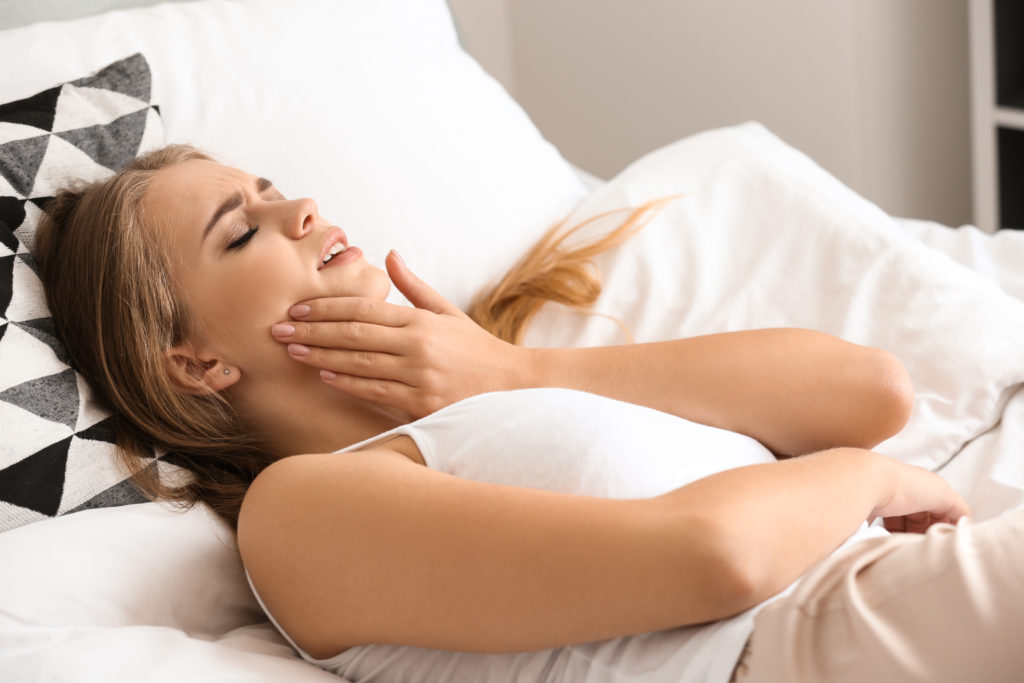What’s The Best Way to Floss
We all know we should floss, but it can be tough. Part of this is because flossing can feel like an extra task in an already busy day, but it...

If your jaw hurts first thing in the morning you may be wondering what could be causing your pain. Waking up with jaw pain, especially if it lessens throughout the day, might actually be caused by grinding your teeth or clenching your jaw while you sleep.
Nighttime grinding or clenching of your teeth is referred to as “bruxism.” Although this can happen during the day, bruxism is common during sleep and is completely involuntary. Because of this, you may be entirely unaware of this activity.
Scheduling an appointment with our dentists is the best way to find out if you are grinding or clenching your teeth while you sleep. The discomfort you feel in the morning, including tooth sensitivity, soreness, tiredness of the face or jaw, headache, or clicking/popping in the jaw, may all indicate bruxism. You might see changes to your teeth, including chips, cracks, or loosened teeth. Your partner may also notice your grinding during the night.
Tooth grinding and clenching can be associated with higher levels of stress and anxiety. Other risk factors can include caffeine, tobacco, alcohol, or certain prescription antidepressants. This behavior can even be genetic. Sometimes there is no way to tell the root cause of tooth grinding or clenching.
A marked increase in tooth grinding has been noticed by dentists throughout the COVID pandemic. Many of the risk factors mentioned above have increased during the pandemic and may be contributing to a rise in tooth clenching and/or grinding, resulting in jaw pain.
It is not always possible to know or treat the root cause of bruxism. As a result, we often treat tooth grinding by managing it and minimizing its effects.
Over-the-counter mouthguards may not be the best option for protecting your teeth. These are one-size-fits-most, and there is often no way to assess their quality. Our dentists, on the other hand, can fit you for a more customized nightguard. This is similar to a retainer and will protect your teeth from the ill effects of nighttime clenching and grinding.
Botox injections to the muscles attached to the jaw have been shown to help with teeth grinding and clenching. While this is an off-label use of Botox, it has been practiced for many years and is considered safe and effective. Unlike cosmetic Botox, this will not alter your appearance and it is important to have this procedure done by an experienced dental professional. At Hoffman Dental Care, we have extensive experience treating facial pain with Botox.
Discuss any medications you are taking with your dentist. They may suggest you speak to your doctor about switching to alternative medications that are not associated with bruxism. Never stop taking medications, especially antidepressants, without talking to your doctor.
Reducing alcohol, caffeine, or tobacco use might help with nighttime teeth clenching or grinding. Focusing on reducing stress and anxiety may also help. If you are experiencing significant stress and anxiety levels that negatively impact your everyday life, talk to your doctor. Practicing yoga, meditation, or breathing exercises may be beneficial for reducing stress and anxiety.
Tooth grinding or clenching can erode the enamel (the protective outer layer) of teeth. This can lead to chipping, cracking, or loosening of the teeth. This can further cause cavities, tooth fractures, or gum conditions.
Grinding or clenching your teeth can lead to facial pain, headaches, and even chronic migraines. While over-the-counter medications may mask these symptoms in the short term, getting treatment for bruxism could alleviate these issues for good.
TMD (temporomandibular disorder) or Temporomandibular Joint Syndrome (often known as TMJ) includes jaw pain, clicking, and/or popping. This can result in pain, discomfort, decreased range of motion, and even difficulty chewing and swallowing.
There appears to be a correlation between sleep apnea and bruxism. Unfortunately, at this point, it is unknown if one causes the other or why exactly the two conditions are related. The good news is that treatment exists for both.
If you wake up with jaw pain and suspect you might be grinding or clenching your teeth at night, schedule an appointment with Hoffman Dental Care to discuss your treatment options.